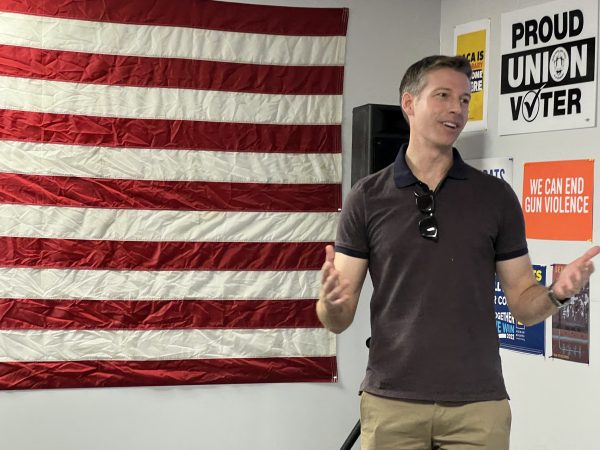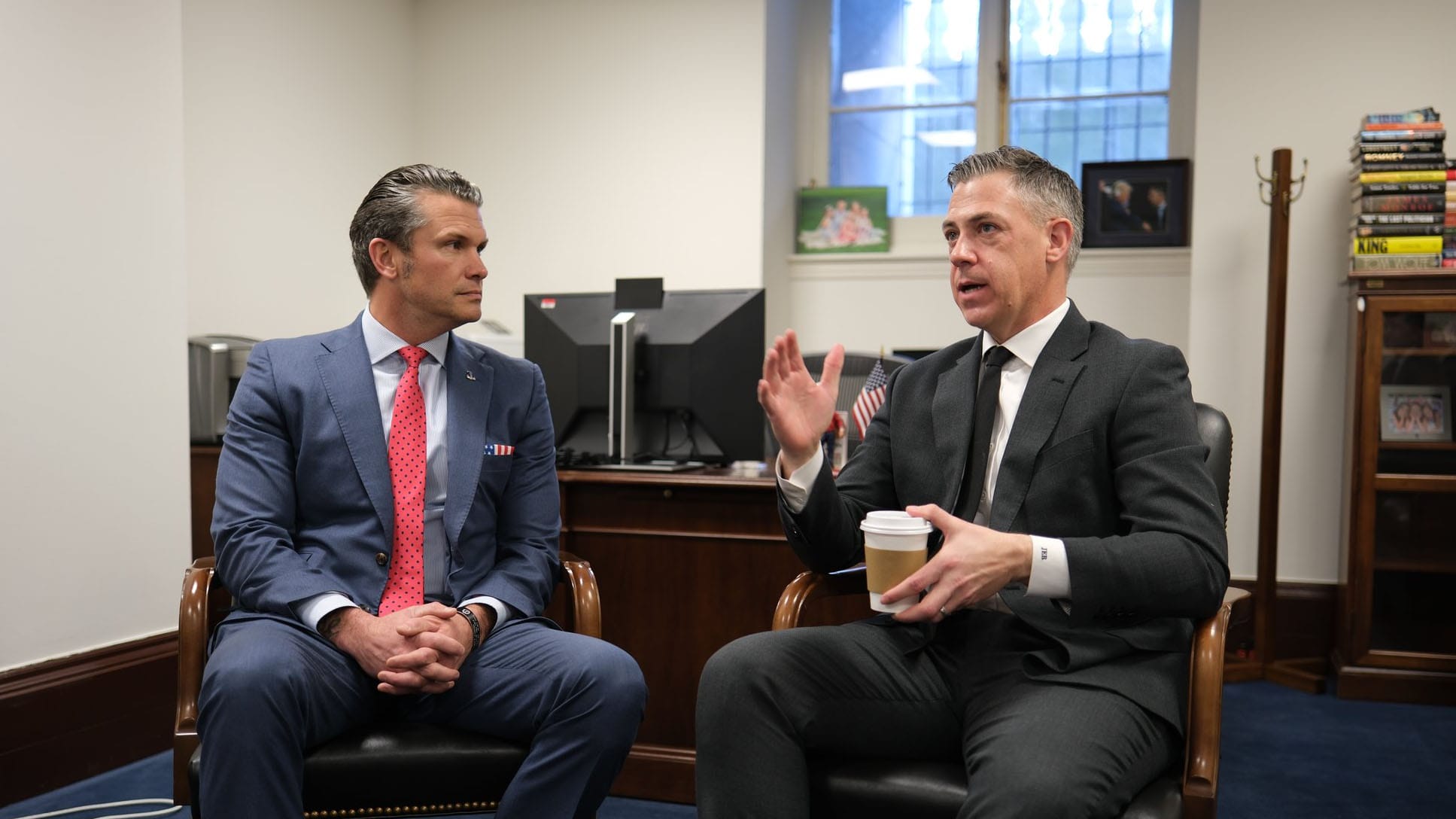Originally by Troy Masters at www.losangelesblade.com
RIVERSIDE, Calif. — Two years ago, openly gay prosecutor Will Rollins launched his first bid for public office and nearly defeated incumbent Republican Congressman Ken Calvert, who has represented California’s 41st Congressional District since the presidential administration of George H.W. Bush.
In this election cycle, the Democratic challenger believes he is even better positioned to win the seat, which could tip control of the U.S. House of Representatives to his party now that Republicans have only a feeble five-member majority in the chamber.
And if accurate proxies can be found in the results of recent polls, quarterly fundraising metrics, and extra muscle deployed by the Democratic Congressional Campaign Committee, it appears Rollins’s confidence is shared by critical masses of voters, donors, and party leaders.
On the one hand, Rollins said he is buoyed by flagging support for his opponent. He argued that instead of working to deliver results for his constituents like “high paying jobs, better wages, and better benefits for workers,” Calvert has instead spent much of his time in Congress helping to fuel costly culture wars and embracing right-wing extremism while enriching himself through “legalized corruption” schemes and undermining the justice system and rule of law.
At the same time, Rollins said that his background in law enforcement, his political orientation as a moderate, and his policy agenda, which includes a focus on popular and often populist reforms, has proven to be a winning formula on the campaign trail from the westernmost parts of Southern California’s Inland Empire to the Colorado Desert town of Palm Springs.
The city, home to a thriving LGBTQ community, helped make the 41st district far purpler after congressional maps were redrawn to include the region in 2022. Rollins said the redistricting helps to explain “part of why people are so bullish on flipping the seat.”
He explained, “Calvert has historically [represented] deep red parts of southern California, and that used to include Murrieta and northern Temecula,” Rollins said. When the new maps were drawn, “he lost those two cities and he gained the Coachella Valley, Palm Springs, Rancho Mirage, Palm Desert, La Quinta, Indian Wells, all of which had previously been represented by a Democrat, Raul Ruiz.”
Rollins is well positioned at this point in the race

Reflecting on his performance in the midterm elections, Rollins noted that 2022 saw higher turnout among Republican voters and lower turnout among Democratic voters, a hurdle made more difficult by the advantages Calvert exercised by virtue of his 32-year incumbency.
By contrast, as a first-time candidate, “when you go from a job as a federal prosecutor, where it’s the antithesis of self-promotion, to suddenly needing to build an entire brand and raise your name I.D. and self promote and campaign, that’s a steep learning curve, and I had basically six months after a primary to do it,” Rollins said.
As November approaches, the presidential race is expected to even out the disparities in voter turnout, and by now Rollins has now spent nearly three years introducing his candidacy and his campaign to residents across CA-41.
For the first time in either cycle, Rollins was ahead of his opponent (by one point) in an internal poll last month that provided respondents with no additional information about the candidates, a sign that “more people are getting to know me, and our name I.D. is increasing, and more people are also hearing our message,” he said.
The Democratic hopeful also noted his campaign out-raised Calvert’s in the third consecutive quarter, Q1 2024, and by more than $1 million, thanks to “voters and our grassroots supporters [who] know that this seat is primed to flip.”
The DCCC seems to agree with their assessment. As one of the organization’s “Red to Blue” candidates, a highly competitive distinction awarded to those with the best odds of unseating Republicans in their districts, Rollins receives “strategic guidance, staff resources, training, and fundraising support” to ensure the best possible odds for his victory in November.
Additional help from the organization responsible for fundraising and organizing on behalf of Democratic House candidates could be decisive in a race as close as this one, but Rollins also stressed his appeal among center and center-right constituents.
Building coalitions in a purple district
For example, the campaign recently secured high-profile endorsements from the likes of Stan Sniff, retired Republican sheriff of Riverside County, and California State Assemblymember Chad Mays, who previously served as the elected Republican leader.
Additionally, last month, the Palm Springs Police Officers Association, which had supported Calvert in 2022, announced it would back Rollins this year. Asked how he managed to win over the organization, Rollins pointed to his ability to relate to law enforcement officers along with his tenacious approach to engaging with the group.
“For cops in Riverside County, having somebody represent them who has worked alongside them, prosecuting MS-13, the Sinaloa Cartel, murderers, rapists, terrorists, that’s really powerful for the line officers who want somebody that understands what it is like every single day to do an important job that they do, putting their lives on the line to keep us safe,” he said.
Rollins added that he was now cowed by the group’s endorsement of his opponent during the midterms and was persistent in reaching out to facilitate a dialogue. “I refuse to give up on trying to persuade people that I would do a better job of representing them in Congress than Ken Calvert, ” as well as his ability to relate to law enforcement officers.
The campaign’s efforts to engage with the Log Cabin Republicans, the conservative LGBT group, were less successful. Rollins said that during both election cycles “we reached out to [chapters located in CA-41] repeatedly, and all of our outreach was ignored.”
It is easy to imagine areas in which the organization could find common ground with the Democratic candidate. Rollins would be the first LGBTQ member of Congress with a law enforcement background, a candidate who has worked for a Republican governor and deliberately engaged with and courted support from other individuals and groups that are right-of-center.
He also questioned why conservative LGBTQ+ Californians would ally themselves with his opponent. “What is Ken Calvert done for you? He’s voted against the Matthew Shepard Hate Crimes Act. He’s voted against letting you serve in the military. It makes no sense to go out and support somebody like that.”
Rollins said it seems Log Cabin “is increasingly used by elected Republicans to try to maintain the appearance of support and to conceal some of their actual record on our rights” and their refusal to engage with him is likely a sign of the extent to which the GOP has become mired in partisanship.
Drawing the contrast
Rollins attributes much of his success in winning major endorsements and contributions to the many contrasts voters are seeing between his campaign and his opponent’s, perhaps starting with the professional backgrounds and records on which they are running.
In recent months, Calvert’s campaign has sought to portray Rollins as “soft on crime” because of his opposition to a criminal justice initiative, California’s Proposition 47, but the former prosecutor told the Blade he welcomes the chance to frame their race around these issues.
Rollins pointed out that while his career was spent “going after drug cartels, terrorists and violent criminals across southern California,” Calvert “is somebody who has voted to defund the FBI, who voted to defund Border Patrol, who said that the FBI has been infiltrated, [that] the Department of Justice has become a political weaponization tool,” and “called for dropping charges against people who assaulted the U.S. Capitol” on January 6.
Further undermining Calvert’s effort to position himself as the “law and order” candidate is the encounter he had with police who found him consorting with a sex worker shortly into his first term in Congress, Rollins said.
He added the incident also shows the hypocrisy of his opponent’s legislative record, considering the Republican’s habit of “voting to get the government into our bedrooms and into our exam rooms, and to prevent gay people from getting married, from serving in the military.”
Rollins, who has prosecuted cases involving white collar crime, also accused his rival of exploiting “a system of legalized corruption” in Congress through which members from both parties have been allowed to exploit the powers and privileges of their office for personal financial gain with loopholes and loose oversight protecting them from consequences.
Specifically, he said Calvert has enriched himself to the tune of $20 million over his 17 terms in office “by using earmarks to benefit his own personal real estate investments,” Rollins said, “a form of insider trading in real estate.”
Rollins said that his opponent has earned a reputation for self-dealing and topped lists of the most corrupt members of Congress, with California’s 41st district taking notice. “When people have seen their own rent and gas and groceries skyrocket while their member of Congress makes $20 million since 1992, that is a major red flag for voters,” he said.
A popular policy platform
The corruption problem is bigger than Calvert, which is why Rollins said he has made reforms and policy solutions in this area a cornerstone of his campaign.
If elected, the Democrat said he will push for “a ban on members trading stock across the board” as well as “a ban on [members] using inside information to benefit their real estate investments” and “a ban on lobbying by former members of Congress.”
Rollins said he will also work to implement term limits for members of Congress and to fix the problems created by the U.S. Supreme Court’s Ruling in Citizens United v. FEC (2010), which allowed for unlimited spending by corporations and outside groups on political campaigns.
He said that even more modest reforms like establishing “disclosure rules for members” would go a long way toward mitigating concerns about the flow of dark money “into these competitive congressional races through independent expenditures.”
Each of these proposals “have been tied into our own theme of the campaign around public service and protecting our communities, and law enforcement service versus self-enrichment, self-dealing,” Rollins said. “There’s no movement to police ourselves, and yet that is what the public craves most,” he added.
Polls have long shown the overwhelming popularity of measures designed to improve the functioning of Congress along with mechanisms requiring more accountability and transparency from its members, which should perhaps come as little surprise considering that 66.7 percent of Americans disapprove of the institution according to FiveThirtyEight.
Rollins said audiences from across the political spectrum have responded enthusiastically whenever he has discussed his anti-corruption proposals, whether before a chamber of commerce or a meeting of the Stonewall Democratic Club.
Generally speaking, rather than “angertainment and click-bait politics,” most Americans want to see policy solutions aimed at addressing real problems, he said. “They want money out of politics. They want common sense solutions to traffic problems in their district. They want safer streets. They want clean energy. They want term limits.”
Likewise with their elected representatives, Rollins said. Voters “want people in the middle, not necessarily on the far left or the far right,” especially in purple districts where “you can run a successful campaign just being on what I call ‘team normal.’”
“The challenge for Democrats,” particularly those running for competitive seats, “is to make it really clear that the current MAGA majority [in the House] is different from the moderate, regular Republican voters in your district,” Rollins said.
Democrats should embrace populism
One way to reassure conservative-leaning voters is for Democrats to talk openly about the problems that helped facilitate the ascent of Donald Trump and the rise of right-wing populist movements, Rollins said.
Americans, regardless of their politics, are right when they say “government is broken,” or “The system is corrupt,” but solutions are not going to come from elected Republicans, least of all “the former host of Celebrity Apprentice,” Rollins said.
The more Democrats elected to the House who “are focused on those reforms, the better the party will do,” he said. “Because our brand can become an anti-corruption brand, and we should try to to cultivate that as much as possible, because certainly the GOP isn’t about that right now.”
Rollins added, “Right now, there’s only one political party that cares about getting money out of politics,” meaning that Democrats have the opportunity to campaign on an issue that “is supported by 90 percent of Americans.”
When it comes to more divisive matters, “a lot of it is tied to kitchen table issues, and I think that’s where we as a party are our strongest, where we’re talking about how it affects your wallet and why the far-right’s focus on culture wars is actually a massive waste of your tax dollars,” Rollins said.
Of course, it is important to call out the ways in which women, LGBTQ communities, and other groups are harmed when elected Republicans endeavor to restrict their rights, freedoms, and protections, but there is also an opportunity to explain why all Americans suffer as a result, he said.
For instance, after noting that Calvert and Congressional Republicans support “a national [abortion] ban with no exceptions,” along with restrictions on access to the abortion medication mifepristone and measures to make it more difficult for women in the military to access reproductive healthcare, Rollins stressed how these moves could damage the economy and threaten national security.
Likewise with LGBTQ rights. “I would be remiss if I didn’t also state the obvious,” Rollins said, “which is Calvert has one of the most horrible anti-LGBTQ rights voting records of any member in Congress, and started his political career by outing Mark Takano,” the gay congressman who ran against him in 1992 and now represents California’s 39th Congressional District.
Rollins said that when the subject comes up on the campaign trail, “I also talk about the way that his votes don’t just impact the LGBTQ community, because obviously they have hurt our community over the years, but they’ve actually hurt every American.”
For instance, he said, “when you try to make it harder for openly gay people to serve in the U.S. military, you deprive us of qualified pilots, snipers, Marines, Navy SEALs, Arabic linguists,” thereby weakening America’s military and security interests.
Rollins also noted the widely reported story last year about pediatric cardiologist Jake Kleinmahon, who ultimately decided to relocate out of Louisiana with his husband and daughter when conservative state lawmakers in Baton Rouge advanced a slate of anti-LGBTQ bills last year.
Following the family’s move to Long Island, Kleinmahon told CNN the only two remaining physicians in Louisiana who manage heart transplants would be expected to serve the same number of patients as they did before his departure.
“That is going to affect care,” he said, adding that “the absolute hardest part is me saying goodbye to my patients.”
“I believe the kids in Louisiana should have the same world class health care as any other part of the United States.”
Read the Original Story





